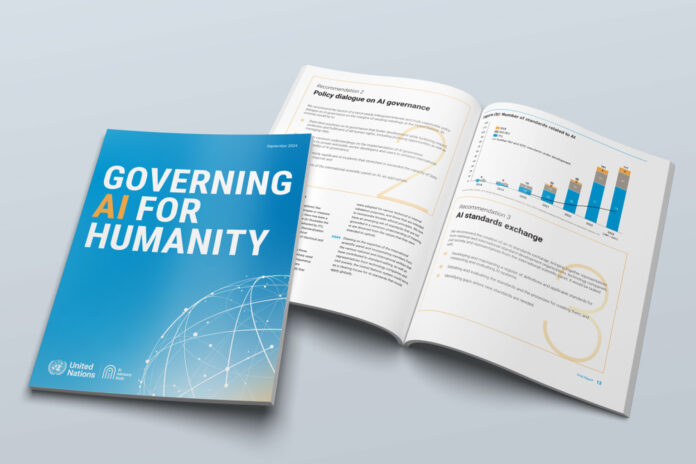
In a landmark move, the United Nations has unveiled a comprehensive global governance framework for artificial intelligence (AI), marking a significant step towards establishing ethical and responsible guidelines for AI technologies. The Global AI Governance report, was released today at UN Headquarters in New York, highlights the growing international concern over AI’s transformative potential, coupled with the risks of its unregulated expansion.
The new governance plan stems from the recommendations of the High-level Advisory Body on Artificial Intelligence, formed in 2023 under the UN Secretary-General’s Roadmap for Digital Cooperation. The advisory body’s report stresses the urgent need for international collaboration, ethical standards, and a cohesive global approach to AI, which is rapidly reshaping sectors like healthcare, agriculture, and education.
At the same time, India has emerged as a notable player in the AI landscape, securing 14th place in the Global AI Index. This new annual index evaluates nations based on their AI innovation, investment, research, and implementation capabilities. India’s ranking signifies its growing prominence in AI development, supported by government initiatives such as the National AI Strategy and increased private sector involvement in AI research and development.
UN’s AI governance initiative: A timely call to action
The UN’s AI governance initiative is rooted in addressing the gaps and risks associated with AI, which have far-reaching implications. According to the report, AI has the potential to accelerate progress on the Sustainable Development Goals (SDGs), optimize industries, and revolutionize scientific research. However, without proper governance, the report warns of AI-induced inequities, widening digital divides, and unchecked power imbalances between nations.
Key areas of concern include AI bias, surveillance, disinformation spread, and the rising energy consumption of AI systems. The report highlights that AI technologies are evolving so rapidly that no single country can effectively govern their use independently. The United Nations emphasizes that AI, like climate change, is a global issue requiring transboundary governance. The UN proposes that AI governance should align with international law, human rights, and the SDGs to create a balanced, inclusive framework that benefits all nations.
India’s steady ascent in AI
India’s 14th position in the Global AI Index represents its expanding capabilities and ambitions in AI innovation. While traditionally trailing behind AI powerhouses like the United States and China, India has accelerated its efforts in recent years. With its rich pool of tech talent, robust IT infrastructure, and government-backed AI initiatives, India has successfully attracted significant AI investments.
Bengaluru and Hyderabad have emerged as AI hubs, fostering both startups and large tech enterprises working on AI applications for sectors like healthcare, agriculture, and manufacturing. AI’s role in India’s healthcare sector is particularly noteworthy, where it is being used to address challenges in medical diagnostics, telemedicine, and drug discovery.
However, India’s AI ecosystem faces challenges. Despite its technological advancements, India must address concerns related to data privacy, the ethical use of AI, and the risk of job displacement due to AI automation. To fully leverage AI, India must also work on expanding digital infrastructure and skill development, particularly in rural areas, to ensure AI’s benefits are distributed evenly.
A new era of global AI governance
The UN’s AI governance initiative offers an unprecedented opportunity for nations like India to shape the future of AI in a way that aligns with global ethical standards. The initiative recommends establishing an international scientific panel on AI, modeled after the Intergovernmental Panel on Climate Change (IPCC). This panel will focus on building a shared understanding of AI’s risks and opportunities and ensuring that all nations, particularly those from the Global South, have a voice in shaping AI’s future.
India’s role in this global dialogue will be critical, especially as the country seeks to balance AI-driven growth with ethical governance. By aligning with the UN’s recommendations, India can further its leadership in AI while ensuring that AI technologies contribute to societal progress rather than exacerbating inequalities.
The report also calls for creating a global fund to support AI capacity-building, particularly for developing nations. This would ensure that AI is not just the domain of a few technologically advanced countries but a tool that benefits humanity as a whole.
The road ahead
As AI continues to evolve, global governance structures will need to keep pace with its rapid development. The UN’s AI governance framework is a critical step towards creating a cohesive international system that promotes innovation while addressing AI’s inherent risks. For India, its current ranking of 14th in the Global AI Index is a milestone that reflects its growing importance in the AI landscape. However, much work remains to be done to ensure that AI technologies are used ethically and equitably, both within India and globally.
In this new era of AI governance, India stands poised to play a pivotal role, balancing the opportunities presented by AI with the responsibilities that come with being a major player on the global stage.









